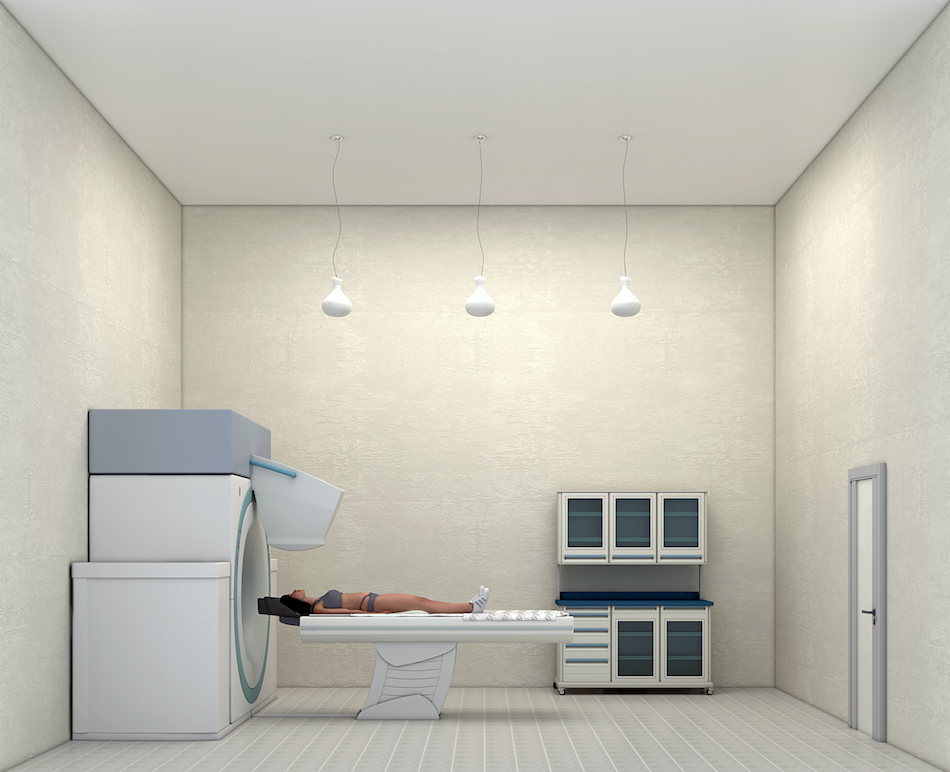Proton therapy is a radiotherapy technique designed to destroy cancer cells by irradiating them with a particle beam. Unlike conventional radiotherapy, it focuses a proton beam on the lesions.
Proton therapy, like all forms of radiotherapy, works by sending ionizing energy particles (accelerated protons) into the tumor. These particles damage the DNA of the cells until they eventually cause their death. Because of their high propensity for cell division, and their reduced ability to repair damaged DNA strands, cancer cells are particularly vulnerable to this attack on their DNA. Protons deploy most of their effects in the heart of the tumor.
Since protons disperse little in the tissues, the proton beam remains concentrated on the shape of the tumor without too much lateral damage to the surrounding tissues.
Proton therapy is recommended for:
• tumours in children
• tumours in the head area
• sinus tumours
• spinal column tumours
• eye tumours
Duration of hospital stay
1 day.
The patient will be able to leave the hospital after the examination.
Average length of stay
1 week.
The length of stay varies according to the patients.
Several sessions may be necessary.

Every year, nearly 11 million patients go abroad in search of medical care. At MEDICAIM, we provide our patients with access to the best hospitals and doctors around the world. Contact us to learn more about your treatment options.
Ask for your free quote abroad
Start your medical stay by requesting a quote. Our customer service department will help you find the clinic that best suits your needs and get you a quote.
Each patient will be seen in consultation by the radiotherapy oncologist in order to collect all clinical, radiological and histological information.
Each patient begins with a consultation with the radiotherapist, then the treatment is simulated on a computer. The file is discussed in meeting with other doctors in order to validate or not the indication for proton therapy.
Preliminary examinations may be necessary such as radiography, ultrasound or angiography to clarify the lesion.
Proton therapy requires a very precise positioning of the patient. Several steps prior to treatment ensure this correct positioning.
The treatment takes place in 4 sessions over 4 consecutive days.
In order to ensure that the patient is placed every day in the same way with the highest precision, radiopaque markers and a personalized restraint system are used at the time of treatment.
Restraint: In most cases, this is a plastic face mask. The basic plastic pattern is placed in hot water to soften. It will be applied to the face of the patient it is going to mold. By cooling, the mask will harden, keeping the shape of the face allowing your head to be placed in the same position at each treatment session. This restraint is used during scanner and MRI (magnetic resonance imaging) imaging examinations and for all treatment sessions.
Markers: To control the daily placement of the patient in proton therapy, it is necessary to implant radiopaque markers in the skull. These are 2 mm x 0.8 mm gold balls or Titanium screws. They are implanted by the radiotherapist or surgeon into the skull bone under local anesthesia or general anesthesia for children. They are visible on the scan sections and on conventional skull x-rays.
Clips in ophthalmology: The clips are placed in the operating room by an ophthalmologist under local or general anesthesia.
Simulation is a preparation session during which the patient is put under the conditions of treatment. It allows the feasibility of the predefined treatment position to be checked by dosimetry and to ensure that the patient tolerates well. It will last from 1 to 2 hours and is performed a few days before the start of radiotherapy.
Treatment includes several sessions of proton therapy, one session per day, 5 days per week for several weeks for intracranial and childhood tumours and 4 sessions for ophthalmological tumours. Each session may include 1 to 3 beams / day.
The treatment session is identical to that of the simulation and begins with a series of radiological images to control and adjust the patient's position.
The average duration of this installation is 35 minutes.
The irradiation lasts one minute on average, the procedure is painless.

After treatment, monitoring consultations take place in the centre that has taken care of you.
This control is regular and includes a clinical examination, more or less associated with additional examinations (ultrasound, angiography, CT scan or MRI) and sometimes blood tests.
Possible side effects:
• Tiredness
• Headaches
• Nausea or vomiting
• Hair loss
• Redness of the skin
• loss of appetite
• Anxiety and depression
• Inflammation
Proton therapy reduces the risk of recurrence of irradiated cancer and the appearance of metastases.
Proton therapy provides great power to treat very sensitive tumors such as intracranial tumors or melanoma of the eye.
Some complex diseases such as cancer can lead some patients to seek a second medical opinion. Almost 50% of patients using the second medical opinion have seen their treatment options evolve. Seeking a second medical opinion is perfectly legitimate when faced with a serious illness.
Click here to find out more about the second MEDICAIM medical opinion
MEDICAIM is looking for the best specialists for you and we will offer you several renowned doctors.
MEDICAIM organizes your entire stay for you: post-operative nursing care, biological follow-up, therapeutic, nutritional and psychological support.
Any additional questions? Ask your MEDICAIM doctor about it: careteam@medicaim.com
Some needs and conditions are more complex than others. In case of doubt, please send us additional information to establish a customized quote.
Ask for a quoteCertains besoins et pathologies sont plus complexes que d’autres. En cas de doute, faîtes-nous parvenir des informations complémentaires pour établir un devis sur-mesure.
Demander un devisEntrust us with your medical file and it will be examined by a specialist doctor. The goal?
Allow you to evaluate all your treatment options.